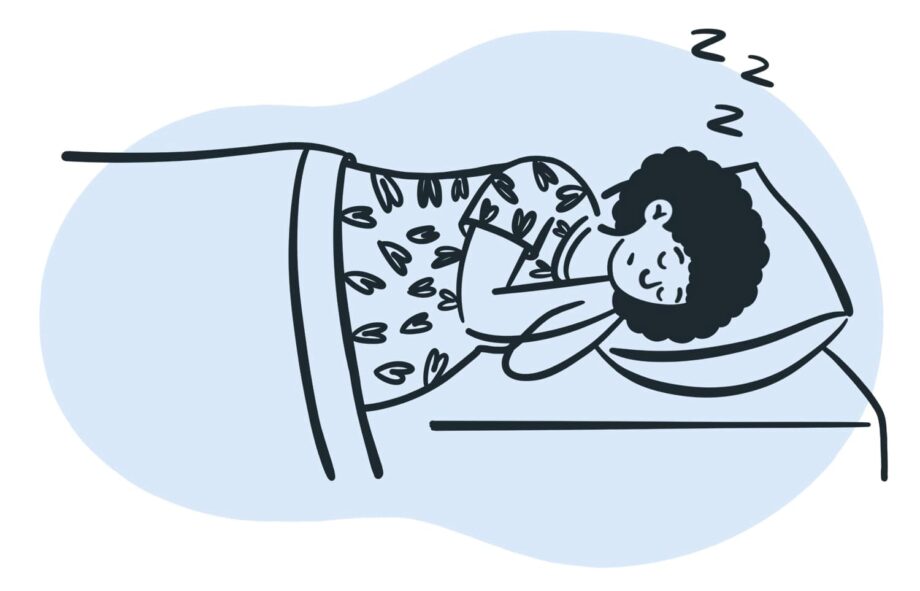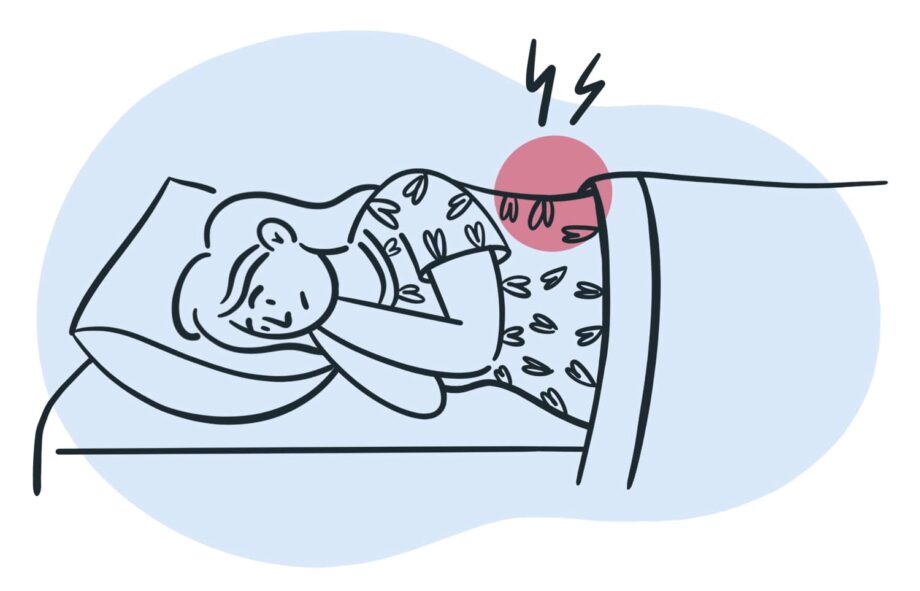Pregnancy & Sleep
Disclosure: By clicking on the product links in this article, Mattress Nerd may receive a commission fee at no cost to you, the reader. Read full disclosure statement.
Expectant parents are often advised to get plenty of sleep while they can because once their bundle of joy arrives, uninterrupted sleep will be a rarity. What they are less likely to be told is just how difficult it can be to get restful sleep when you’re pregnant.
A study published in the journal Sleep Medicine involving nearly 2,500 pregnant women confirms this theory. It found that more than three-quarters of study participants reported that they suffer from poor sleep quality, more than half experience insomnia, and virtually all frequently wake up at night.
“It is super important to get enough sleep while pregnant,” says Stephen Light, CMO and co-owner of Nolah Mattress. Sleep deprivation not only makes you feel exhausted the next day, it can also increase feelings of anxiety and depression. Long-term sleep deprivation can also increase the risk of heart disease, kidney disease, high blood pressure, and type 2 diabetes.
When you’re pregnant, insufficient sleep can have other ill effects for both mother and baby, ), says Dr. Daniel Boyer of the Farr Institute. “Lack of quality sleep during pregnancy has been linked to gestational diabetes mellitus. This is because sleep plays an important role in regulating blood sugar,” he says. “In addition, lack of or too much sleep during early stages of pregnancy can lead to the development of high blood pressure as per research findings. Severe sleep deprivation in the third trimester of pregnancy may also raise the risk of preeclampsia (a condition that can lead to preterm delivery and long-term medical complications for the mother’s heart, kidney and other organs).”
Despite the importance of food sleep during pregnancy, nearly 28 percent of expectant moms end up getting less than seven hours of sleep each night, according to The nuMoM2b Pregnancy and Sleep Duration and Continuity Study. This is less than the seven to nine hours recommended by sleep experts.

Sleep Changes During Pregnancy
A woman’s sleep changes as she progresses through pregnancy, according to research published in Obstetrics Medicine.
In early pregnancy, increases in the hormone progesterone cause sleepiness, so you may feel more tired during the day and sleep longer at night. But it can also trigger sleep-hindering symptoms such as nausea and urinary frequency.
As pregnancy hormones begin to balance out by the second trimester, energy levels improve, and bathroom breaks during the night become fewer and farther between. However, new issues arise as the fetus develops. Fetal movements become more active at night. And the extra weight you’re carrying around can give rise to leg cramps and restless leg syndrome.
By the time mothers reach the third trimester, 66 percent report having sleep disruptions, and more than 73 percent say they experience some degree of insomnia. There are plenty of reasons for this. As a mother’s belly expands, it becomes more difficult for her to find a comfortable sleeping position. The urgency to urinate also resurfaces as the baby’s weight begins putting pressure on the bladder. Heartburn and anxiety can also set in.
However, getting a good night’s sleep doesn’t have to be an intangible dream. By identifying their sleep disruptions, moms-to-be can make specific lifestyle changes to improve overall sleep quality so they can feel well-rested by the time their bundles of joy arrive.
Common Sleep Disturbances During Pregnancy
Here are some common sleep disturbances and disorders experienced during pregnancy:
- Nausea and vomiting — These classic symptoms of so-called morning sickness are likely caused by increasing pregnancy hormones like human chorionic gonadotropin (HCG). Morning sickness usually occurs during the first trimester of pregnancy. However, some women experience severe nausea and vomiting through the second or even third trimester.
- Frequent urination — This common early sign of pregnancy usually occurs due to increases of the hormone progesterone and HCG. The need to urinate eases up during the second trimester but usually returns in the third trimester as the baby begins to move down the birth canal (and as a result, put pressure on the bladder) in preparation for labor and delivery.
- Tender breasts — Hormones are to blame again. This time, surging estrogen, progesterone, and prolactin (the hormone that stimulates milk production) increases blood flow to the breasts and can make them feel tender and sore.
- Fetal movements — Around 16 to 25 weeks into pregnancy, most women begin to feel their baby start to move. Babies usually become more active at night, which can be both sweet and sleep-disrupting.
- Heartburn — This common pregnancy symptom occurs when stomach acid moves up the esophagus and causes a burning sensation in the chest or throat. Heartburn during pregnancy can be caused by the slowing of digestion caused by those shifting hormones and the growing girth of the baby pushing against the stomach.
- Back aches — The weight of a growing baby can put pressure on the back and cause backaches. Any form of chronic pain, especially back pain, can interfere with sleep.
- Leg cramps — It can be challenging for legs to get used to carrying around an extra 25 pounds in baby weight, and they can rebel by cramping up at night. Leg cramps can also be aggravated by the added pressure on the legs’ nerves and blood vessels.
- Restless leg syndrome — Also referred to as RLS, restless leg syndrome is a creepy, crawling, tingling, or simply “strange” feeling in the legs that makes sufferers want to jerk or move them. The condition usually gets worse during the night and the best way to relieve the sensation is by walking around. No one really knows why RLS is a common problem in pregnant women, but some researchers think it has something to do with the brain chemical dopamine. Other suspected causes include inadequate folic acid or iron, and rising levels of estrogen.
- Anxiety — Pregnancy can stir various emotions, making you more susceptible to anxiety and stress — two common sleep disruptors. Anxiety can be amplified if the pregnancy is unplanned or unwanted or if there are concerns about the baby or mother’s health.

How to Get a Better Night’s Sleep While Pregnant
It is possible for pregnant women to sleep better at night. We asked some experts to weigh in with their suggestions:
- Limit fluids one to two hours before bedtime, says naturopathic doctor Leigha Saunders. “With a growing baby putting increasing pressure on your bladder, you don’t want any extra reason to wake up,” she says. “Limit fluids before bedtime so you can fully empty your bladder before you go to sleep, decreasing the chance, or at least frequency, you wake up at night to use the bathroom.”
- Sleep on your side. Doctors recommend pregnant women sleep on their sides for comfort and safety. While back sleeping is preferred for the non-pregnant, doing so while pregnant puts the entire weight of the growing fetus on the back, intestines, and vena cava, the large vein that carries blood back to the heart from the lower body.
- Snuggle up with a body pillow. “A body pillow can help keep you comfortable while side sleeping when pregnant by keeping your spine, hips and lower back in alignment,” Saunders says. “Sleeping with a body pillow can also help to support that growing baby bump.”
- Strategically place pillows. “Many individuals find that placing a pillow between their legs, under their baby bump or under the small of their back helps them have an easier time getting to sleep while pregnant,” Light says.
- Keep your sleep environment cool and comfy. “When pregnant, you often feel warmer than usual due to the increase in overall blood volume and circulation. However, your core body temperature has to drop to initiate and maintain deep sleep,” Saunders says. Try setting the thermostat a few degrees cooler than you do during the day to stay cool and comfortable throughout the night.
- Invest in a new mattress and bed linens. A new mattress that provides just enough cushioning and support can greatly improve sleep. So can a new set of sheets. “Choose a bedding like bamboo that’s cooling and wicks moisture and body heat away,” Saunders says. And sleep with lightweight pajamas or no pajamas at all.
- Create a relaxing nighttime routine. It’s easier to fall asleep when you’re relaxed, so engage in some soothing nighttime activities before bedtime, such as yoga, meditation, or breathing exercises. You can also use this time to practice your focus to help you manage the pain of contractions during delivery.
Final Thoughts
There are numerous benefits to getting a good night’s sleep for both you and your unborn baby. “Sleep plays a major role in memory, learning, appetite, mood, and sound decision making, which are important for the mother’s and the baby’s wellbeing,” Boyer says.
However, doing so is easier said than it sounds. “You know that a new baby is definitely going to disrupt your sleep, so cashing in on sleep before he or she arrives is key,” Saunders says. “But getting comfortable and sleeping through the night when you’re pregnant can sometimes be tricky.”
With a good understanding of what to expect — and a few lifestyle changes to combat the challenges —you can rest assured that good, restorative sleep is within reach.


